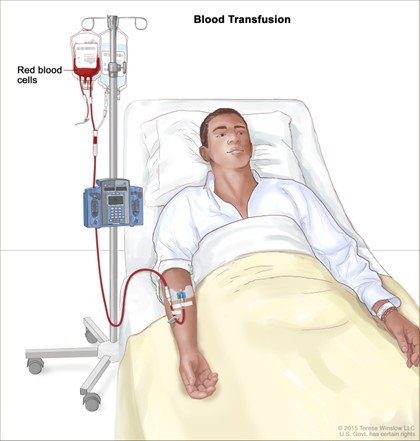A nurse is caring for a client who has chronic renal failure.
The client displays the following ABG results: pH 7.24, PaCO2 44 mm Hg, PaO2 84 mm Hg. HCO3 18 mEq/L, base excess -2, and O2 saturation 95%.
The nurse should conclude that the client has which of the following acid-base imbalances?
Respiratory acidosis.
Metabolic alkalosis.
Respiratory alkalosis.
Metabolic acidosis.
The Correct Answer is D
The client’s ABG results show a pH of 7.24, which is below the normal range of 7.35-7.45 and indicates acidosis.
The PaCO2 is within the normal range of 35-45 mm Hg, indicating that the acidosis is not caused by a respiratory issue.
The HCO3 level is 18 mEq/L, which is below the normal range of 22-28 mEq/L and indicates a primary metabolic cause for acidosis.
Respiratory acidosis is not indicated by the ABG results as the PaCO2 is within the normal range.
B) Metabolic alkalosis is not indicated by the ABG results as the pH and HCO3 levels are below their respective normal ranges.
C) Respiratory alkalosis is not indicated by the ABG results as the pH is below the normal range and the PaCO2 is within the normal range.
Nursing Test Bank
Naxlex Comprehensive Predictor Exams
Related Questions
Correct Answer is B
Explanation

The priority action for a nurse caring for an older adult client who is suspected of having septicemia is to obtain a blood specimen for culture and sensitivity testing.
This test will help identify the specific microorganism causing the infection and determine the most effective antibiotic treatment.
Choice A is incorrect because while a WBC count with differential can provide information about the presence of an infection, it does not identify the specific microorganism causing the infection.
Choice C is incorrect because while obtaining a history to determine recent injuries can provide useful information, it is not the priority action.
Choice D is incorrect because while administering a broad-spectrum antibiotic may be necessary, it should not be done before obtaining a blood specimen for culture and sensitivity testing.
Correct Answer is A
Explanation
The correct answer is A. Back pain.
Choice A reason: Back pain during a blood transfusion is a classic symptom of a hemolytic transfusion reaction. This type of reaction occurs when the immune system attacks the transfused red blood cells, leading to their destruction. Back pain is considered a more specific and early sign of this reaction.
Choice B reason: Bradycardia, which is a slower than normal heart rate, is not typically associated with hemolytic transfusion reactions. The normal range for an adult’s resting heart rate is between 60 to 100 beats per minute. Bradycardia is usually considered when the heart rate is lower than 60 beats per minute in a resting adult. It can be a sign of a well-trained athlete or can occur as a result of certain medications or heart conditions, but it is not a recognized symptom of a hemolytic transfusion reaction.
Choice C reason: Hypertension, or high blood pressure, is also not a common symptom of a hemolytic transfusion reaction. Normal blood pressure ranges from 90/60 mmHg to 120/80 mmHg. Hypertension is typically defined as having a blood pressure higher than 130/80 mmHg. While hypertension can be a serious condition, it is not indicative of a hemolytic transfusion reaction.
Choice D reason: Chills are a symptom that can be associated with a hemolytic transfusion reaction, often occurring alongside fever and back pain. However, while chills can indicate a reaction, back pain is a more specific symptom that can help differentiate a hemolytic reaction from other types of transfusion reactions.

Whether you are a student looking to ace your exams or a practicing nurse seeking to enhance your expertise , our nursing education contents will empower you with the confidence and competence to make a difference in the lives of patients and become a respected leader in the healthcare field.
Visit Naxlex, invest in your future and unlock endless possibilities with our unparalleled nursing education contents today
Report Wrong Answer on the Current Question
Do you disagree with the answer? If yes, what is your expected answer? Explain.
Kindly be descriptive with the issue you are facing.
